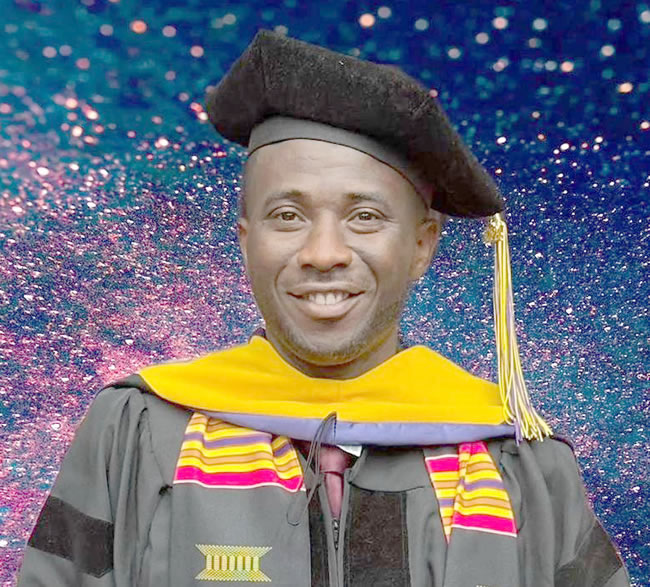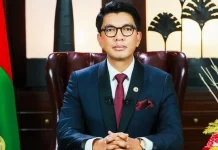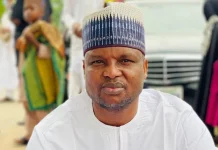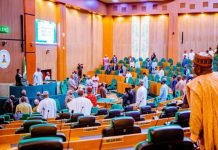🌿 Ruzu Non-Alcoholic Herbal Bitters
Ruzu Non-Alcoholic Herbal Bitters is a natural health supplement specially formulated to:
- ✅ Promote general wellness
- ✅ Detoxify the body
- ✅ Support the treatment of various ailments
Made from a powerful blend of 100% organic and medicinal herbs, Ruzu is completely alcohol-free, making it ideal for:
- 👪 All age groups
- 🌱 Health-conscious individuals
- 🌿 Anyone seeking non-alcoholic herbal remedies
Whether you're looking to boost your vitality, cleanse your system, or support healing the natural way, Ruzu Bitters offers a trusted herbal solution.
Samuel Babatunde is the first African and second international student to bag a PhD in Environmental Science at Western Illinois University since it was established 125 years ago. In this interview with IFEDAYO OGUNYEMI, he speaks on his drive, the challenges he overcame, and what this feat means to Africans Nigerians and Africans.
How does it feel to be the first African and first male, as well as the second international student, to earn a PhD in Environmental Science from Western Illinois University?
Firstly, I give God all the glory and adoration for His faithfulness and unflinching Grace. It is an incredible honour. I feel deeply humbled by this milestone. It is a testament to resilience, faith, and the power of education to break barriers. Being the first African in this regard is not just my achievement but a victory for all those who dare to dream and work hard towards it.
How has this achievement changed your outlook on your personal and professional future?
This achievement has significantly broadened my perspective on what is possible, personally and professionally. It has reaffirmed my belief that hard work, perseverance, and a clear vision can overcome even the most daunting challenges. Professionally, it has opened doors to global opportunities in environmental science, policy development, and sustainable agriculture. Personally, it has strengthened my commitment to mentoring and empowering others, particularly young Africans, to pursue their dreams and contribute meaningfully to society.
What inspired you to pursue a PhD in Environmental Science?
My journey was borne out of a passion for environmental sustainability and the need to address pressing challenges like nutrient leaching, pollution, and climate change. Growing up, I saw firsthand how environmental degradation affected communities in agricultural regions. I wanted to be part of the solution by combining science, policy, and practice. That vision led me to Western Illinois University and, ultimately, to this achievement.
In what ways did your upbringing influence your academic and career choices?
I grew up in a humble environment where resources were limited, but the values of resilience, discipline, and a thirst for knowledge were deeply instilled in me. My parents emphasised education as the key to breaking barriers and creating opportunities. Growing up in an agricultural community exposed me to the challenges farmers face, such as low crop yields and environmental degradation.
These experiences sparked my interest in finding solutions to improve agricultural productivity while preserving the environment. It also fueled my desire to pursue advanced studies, particularly in environmental science, to address these issues in a scientific and impactful way.
Looking back, what would you say to your younger self just starting this journey?
I would tell my younger self to embrace the journey with courage and patience. The path may be uncertain sometimes, but every challenge you face shapes you into a stronger and more resourceful person. Trust in your ability to adapt and learn, and never let setbacks define your worth or derail your goals. Always remember that your background is not a limitation but a foundation for the great things you can achieve. Most importantly, seek mentors, stay grounded in your values, and celebrate every small victory along the way.
Can you share some highlights of your PhD research?
My research focused on the impact of cover cropping to control nutrient leaching into water bodies, reduce nutrient loss from farms, and enhance environmental sustainability. Over three years, I worked extensively on field experiments, data analysis, and collaborative projects. The findings underscored how adopting cover cropping practices can significantly improve soil health and reduce agricultural runoff, benefiting farmers and the environment.
How do you see your research findings being applied in real-world agricultural practices?
My research on cover cropping and nutrient management has direct applications in reducing nutrient loss from farms, controlling water pollution, and improving soil health. These practices can help farmers achieve sustainable agricultural productivity while mitigating environmental impacts. For example, by adopting cover cropping, farmers can enhance soil structure, reduce the need for synthetic fertilisers, and prevent nutrient leaching into water bodies. This is particularly important in regions like Sub-Saharan Africa, where soil fertility is a critical issue. Policymakers and agricultural extension services can use these findings to promote sustainable farming techniques.
What were some of the challenges you faced during this journey?
Balancing rigorous academic work with family responsibilities and financial constraints was challenging. There were moments of self-doubt, but I drew strength from my faith, my supportive family, and my mentor, Professor Roger Viadero. Adapting to a different academic culture as an international student also posed challenges, but it made me more determined to succeed.
What challenges did you face as the first African in your programme, and how did you navigate them?
Being the first African in my programme came with unique challenges, such as cultural differences, feelings of isolation, and the pressure to prove myself. Sometimes, I encountered stereotypes and had to work harder to demonstrate my competence. To navigate these challenges, I built strong relationships with my professors and peers, actively sought mentors, and remained confident in my abilities. I also made it a priority to share my cultural background, which helped bridge gaps and foster mutual understanding. These experiences taught me the value of resilience, self-advocacy, and the importance of creating a support system, even in unfamiliar environments.
What role did mentorship play in your success?
Mentorship was pivotal. Professor Viadero, my advisor, was not just a mentor but also a guide and a source of encouragement. He believed in my potential even when I felt weak and doubted myself. The collaborative environment at Western Illinois University also allowed me to engage with committee members and colleagues who enriched my research journey.
What does this milestone mean for African and international students aspiring to study abroad?
It sends a powerful message that no dream is too big, regardless of your background. African students have the potential to excel globally, and this achievement shows that barriers can be broken with determination, hard work, and support. I hope it inspires more Africans to pursue higher education, especially in fields like environmental science that are critical to our continent’s future.
What innovations or advancements do you believe are most urgently needed in the field of environmental science?
The most urgent innovations in environmental science include technologies for precise nutrient management, advanced monitoring of water quality, and scalable solutions for renewable energy in agriculture. Developing affordable and accessible tools for smallholder farmers, such as mobile apps for soil testing and weather predictions is crucial.
Additionally, advancements in carbon sequestration techniques, circular economy models, and policies to integrate sustainability into mainstream agricultural practices are necessary to address global environmental challenges effectively.
What role do you think African nations can play in global environmental sustainability, especially in agriculture?
African nations have a unique opportunity to lead global environmental sustainability by leveraging their vast natural resources and indigenous knowledge. Africa can adopt climate-smart agriculture to improve food security while reducing greenhouse gas emissions. By investing in sustainable land management, agroforestry, and renewable energy, African nations can position themselves as leaders in green innovation. Additionally, Africa’s youthful population and growing interest in technology can drive advancements in data-driven solutions for environmental challenges. Global partnerships and policies that prioritise equity and inclusion will also enhance Africa’s role in addressing global sustainability.
What specific initiatives or projects are you planning to undertake in Africa to address environmental challenges?
I plan to focus on projects that integrate sustainable agricultural practices with community development. One initiative involves establishing training centres for farmers to adopt cover cropping, nutrient management, and other eco-friendly techniques. I also intend to collaborate with local governments to promote policies that incentivise sustainable farming. Another key project is the development of a cassava processing plant that minimises waste and integrates renewable energy sources. Finally, I aim to mentor young scientists and advocate for greater research funding to address Africa’s unique environmental challenges.
What is next for you after this historic accomplishment?
I am committed to applying my expertise to real-world environmental challenges. My immediate focus is on consulting, research, and policymaking, particularly in sustainable agriculture and water resource management. I also hope to mentor young Africans, guiding them to achieve even greater milestones. Education is a continuous journey, and I am eager to contribute to global environmental sustainability efforts.
What are your final words for aspiring scholars?
Believe in your dreams and work tirelessly to achieve them. Surround yourself with mentors and a supportive community. Finally, never underestimate the power of prayer and resilience. To all aspiring scholars, especially in Africa, the world is waiting for your contribution. Go out there and make it count.
READ ALSO: Reforming higher education in Africa
















